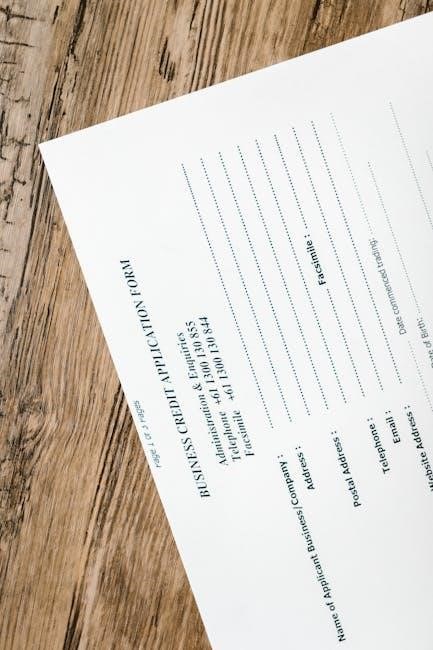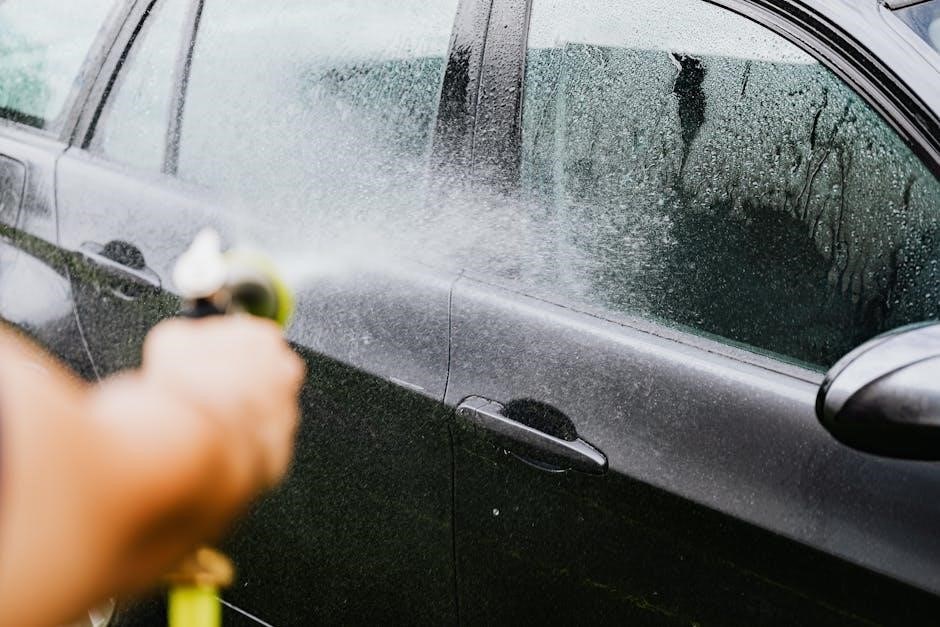Pressure Washing Contract Template PDF: A Comprehensive Guide
A pressure washing contract template PDF is a crucial document for pressure washing businesses. It outlines the services, payment terms, and responsibilities of both the service provider and the client. Using a template ensures clarity and legal protection for all parties involved.
In the realm of exterior cleaning services, pressure washing stands as a vital technique for rejuvenating surfaces and enhancing curb appeal. A pressure washing contract serves as the cornerstone of a successful project, establishing a clear understanding between the service provider and the client. It meticulously outlines the scope of work, payment terms, and potential liabilities, ensuring transparency and protecting the interests of both parties.
This agreement is essential for both residential and commercial projects. By formalizing the arrangement, it mitigates the risk of misunderstandings and disputes. The contract should specify the exact areas to be cleaned, the methods used, and any specific client requests. It is a legally binding document.
Furthermore, a well-drafted pressure washing contract fosters professionalism and trust. It demonstrates that the service provider is committed to delivering quality services and upholding ethical business practices. This commitment can lead to stronger client relationships and repeat business.
Why Use a Pressure Washing Contract Template?
Employing a pressure washing contract template offers numerous benefits for both the service provider and the client. Firstly, it ensures clarity and minimizes potential misunderstandings by explicitly defining the scope of work, payment terms, and responsibilities. This prevents disputes arising from differing expectations.
Secondly, a template saves time and effort. Instead of drafting a contract from scratch for each project, a template provides a pre-structured framework that can be easily customized. This allows businesses to focus on their core operations.
Thirdly, it enhances professionalism. A well-formatted contract demonstrates that the service provider is organized and committed to providing quality service. This can build trust with clients and improve the business’s reputation.
Fourthly, a template offers legal protection. It outlines the rights and obligations of each party, reducing the risk of legal disputes. It can also include clauses addressing liability, insurance, and dispute resolution mechanisms. This safeguard is essential.
Key Elements of a Pressure Washing Contract
A comprehensive pressure washing contract should incorporate several key elements to ensure clarity and legal soundness. The initial component involves a detailed description of the scope of work, specifying the exact services to be performed, such as cleaning siding, patios, or driveways, including square footage.
Payment terms are equally crucial, outlining the total cost, payment schedule, deposit requirements, and acceptable payment methods. This section should also address late payment fees or penalties.
Liability and insurance provisions protect both parties by specifying insurance coverage, liability limitations, and procedures for handling property damage or personal injury. Customer responsibilities should also be clearly defined, including providing access to water sources and ensuring the safety of the premises.
Finally, the contract should include clauses addressing cancellation policies, warranty and guarantee terms, and dispute resolution mechanisms, such as mediation or arbitration. These elements collectively contribute to a well-structured and legally binding agreement.
Scope of Work
The scope of work section is a critical component of any pressure washing contract, as it precisely defines the services that the contractor will provide. This section should clearly outline which areas of the property will be pressure washed, such as the home’s siding, patio, deck, driveway, or specific concrete surfaces.
It’s essential to include detailed measurements, specifying the area in square feet to be cleaned, ensuring both parties have a clear understanding of the project’s extent. The contract should also list the specific cleaning methods and materials to be used, addressing any concerns about potential damage to sensitive surfaces.
Furthermore, any additional services, like pre-treatment or post-treatment applications, should be explicitly stated. By providing a comprehensive description of the work to be performed, the scope of work section minimizes misunderstandings and potential disputes, establishing a solid foundation for a successful project.
Payment Terms
The payment terms section of a pressure washing contract is crucial for establishing clear financial expectations between the service provider and the client. This section should specify the total cost of the pressure washing services, including any applicable taxes or additional fees. It should also outline the payment schedule, detailing when payments are due, such as upon completion of the job or in installments.
The accepted methods of payment, like cash, check, credit card, or electronic transfer, must be clearly stated. It’s also important to include information about any deposits required before work commences, along with the conditions under which the deposit is refundable or non-refundable.
Furthermore, the contract should address late payment penalties, such as interest charges or suspension of services, to ensure timely payments. By clearly defining these payment terms, both parties can avoid misunderstandings and maintain a professional financial relationship throughout the pressure washing project.
Liability and Insurance

The liability and insurance section of a pressure washing contract is critical for protecting both the service provider and the client. This section should clearly state the service provider’s responsibility for any damages caused to the property during the pressure washing process. It should also outline the limits of their liability and the procedures for reporting and addressing any claims.
Furthermore, this section should detail the insurance coverage held by the pressure washing company, including general liability insurance and worker’s compensation, if applicable. Proof of insurance should be provided to the client upon request to demonstrate the company’s financial responsibility.
The contract should also specify that the client is responsible for securing any necessary permits or approvals for the pressure washing work and for ensuring the safety of their property and belongings. By clearly defining these aspects of liability and insurance, both parties can mitigate potential risks and ensure a smooth and secure pressure washing experience.
Customer Responsibilities
The “Customer Responsibilities” section of a pressure washing contract template outlines the obligations of the client to ensure the successful completion of the service. These responsibilities typically include providing access to the property, ensuring that all windows and doors are securely closed and locked, and moving any delicate or valuable items away from the areas to be cleaned.
Customers may also be responsible for providing a water source with adequate pressure and volume, as well as ceasing all water consumption inside the home during the pressure washing process if they are on well water or in an area with low water pressure.
Additionally, clients should inform the pressure washing company of any potential hazards, such as underground utilities or fragile surfaces, and ensure that pets and children are kept away from the work area for safety reasons. Clear communication and adherence to these responsibilities help to prevent misunderstandings and ensure a smooth and efficient service.
Essential Clauses in a Pressure Washing Contract
A pressure washing contract requires several essential clauses to protect both the service provider and the client. These clauses clearly define the terms of the agreement and help prevent misunderstandings or disputes. Key among these is a detailed “Scope of Work” clause, which specifies the exact services to be performed, including the areas to be pressure washed and any additional services agreed upon.
The “Payment Terms” clause outlines the total cost of the service, the payment schedule, and acceptable methods of payment. A “Cancellation Policy” is crucial, specifying the conditions under which either party can cancel the contract and any associated fees or penalties.

Furthermore, a “Warranty and Guarantee” clause details the quality of work expected and any guarantees offered, as well as the recourse available if the client is unsatisfied. Finally, a “Dispute Resolution” clause outlines the process for resolving any disagreements, such as mediation or arbitration, ensuring a fair and efficient resolution.
Cancellation Policy
A well-defined cancellation policy within a pressure washing contract is essential for managing expectations and protecting both the service provider and the client. This clause outlines the circumstances under which either party can terminate the agreement before the services are rendered. It should clearly state the notice period required for cancellation, typically expressed in days or hours.
The policy should also address any fees or penalties associated with cancellation, particularly if the service provider has already incurred costs, such as purchasing supplies or scheduling personnel. For instance, a client might forfeit a deposit if they cancel within a short timeframe before the scheduled service. Conversely, the service provider might offer a full refund if they cancel due to unforeseen circumstances like equipment failure or inclement weather.
Furthermore, the cancellation policy should specify the method of notification, such as written notice via email or certified mail, to ensure a clear record of the cancellation. This clause aims to provide a fair and transparent process for both parties, minimizing potential disputes and ensuring professional conduct.
Warranty and Guarantee
Including a warranty and guarantee clause in a pressure washing contract provides assurance to the client regarding the quality of the work performed. This section specifies the duration and scope of the guarantee, outlining what remedies are available if the client is not satisfied with the results. A typical warranty might cover issues such as uneven cleaning or streaks left on surfaces, ensuring the service provider will return to rectify these problems.

The clause should clearly define the limitations of the warranty, excluding damages caused by factors outside the service provider’s control, such as pre-existing conditions, natural disasters, or improper maintenance by the client. It’s also important to specify the procedure for making a claim under the warranty, including the timeframe for reporting any issues and the required documentation, such as photographs or detailed descriptions of the problem.
Additionally, the warranty and guarantee clause should address any exclusions, such as certain types of surfaces or stains that are not covered. By clearly outlining these terms, the service provider can manage client expectations and avoid potential disputes, fostering a positive and trustworthy business relationship.
Dispute Resolution
The dispute resolution clause in a pressure washing contract outlines the process for resolving disagreements between the service provider and the client. This section aims to provide a structured approach to address potential conflicts, minimizing the need for costly and time-consuming litigation. A well-drafted dispute resolution clause typically includes steps such as negotiation, mediation, or arbitration.
Negotiation involves direct communication between the parties to reach a mutually agreeable solution. Mediation involves a neutral third party who facilitates discussions and helps the parties find common ground; Arbitration, on the other hand, involves a neutral arbitrator who makes a binding decision after hearing evidence and arguments from both sides.
The clause should specify the preferred method of dispute resolution, the location for conducting mediation or arbitration, and the rules governing the process. It may also include provisions for cost-sharing, such as each party bearing their own legal fees or splitting the costs of mediation or arbitration. By clearly defining the dispute resolution process, the contract promotes a fair and efficient way to address disagreements, protecting the interests of both the service provider and the client.
Free Pressure Washing Contract Templates

Securing a reliable pressure washing contract is essential for both service providers and clients. Fortunately, numerous free pressure washing contract templates are readily available online, offering a convenient starting point for creating a professional agreement; These templates provide a basic framework that can be customized to suit specific needs and circumstances.
Several websites offer downloadable PDF or Word document templates. These resources often include standard clauses covering scope of work, payment terms, liability, and customer responsibilities. While free templates offer a cost-effective solution, it’s crucial to review them carefully and adapt them to your specific business practices and local regulations.
Keep in mind that free templates may not cover all potential scenarios or legal nuances. Consulting with a legal professional is advisable to ensure that the contract adequately protects your interests. However, for many small businesses and individual contractors, a free pressure washing contract template provides a valuable foundation for establishing clear and legally sound agreements with clients. Remember to tailor the template to reflect the specifics of each job.
Customizing Your Pressure Washing Contract Template
While free templates offer a great starting point, customizing your pressure washing contract template is crucial for addressing the unique aspects of your business and each project. Start by adding your company’s logo and contact information to establish a professional brand identity. Tailor the “Scope of Work” section to explicitly detail the services you’ll provide, including specific areas to be cleaned and any exclusions.
Adjust the “Payment Terms” to reflect your preferred payment schedule, accepted methods, and any late fee policies. Clearly outline customer responsibilities, such as providing access to water and electricity, and preparing the area for cleaning. Include specific clauses relevant to your services, such as detailing the types of cleaning solutions you use and any potential risks to surfaces.
Furthermore, consider adding clauses to address potential issues like unforeseen damage or weather delays. Review the template’s legal language and modify it to comply with local regulations. By personalizing the contract, you ensure it accurately reflects your business practices, protects your interests, and provides clarity for your clients, leading to smoother transactions and stronger professional relationships.
Legal Considerations for Pressure Washing Contracts
When drafting a pressure washing contract, several legal considerations must be addressed to protect your business and ensure compliance. First and foremost, ensure the contract complies with all applicable local, state, and federal laws. This includes regulations related to business licensing, consumer protection, and environmental standards. Clearly define the scope of work to avoid disputes over what services are included.
Carefully consider liability clauses, outlining responsibility for property damage or personal injury. Consult with an insurance professional to ensure your policy adequately covers potential risks associated with pressure washing. Include a clause addressing unforeseen circumstances, such as weather delays or unexpected repairs, and how these issues will be handled.
It’s also important to have a dispute resolution mechanism in place, such as mediation or arbitration, to avoid costly litigation. Before finalizing your contract, have it reviewed by a legal professional familiar with contract law in your jurisdiction. This review can identify potential loopholes or ambiguities that could lead to legal challenges. By addressing these legal considerations, you can create a legally sound pressure washing contract that protects your business and fosters trust with your clients.
Tips for Creating a Clear and Effective Contract
Creating a clear and effective pressure washing contract is crucial for protecting your business and ensuring customer satisfaction. Start by using simple, straightforward language that is easy for your clients to understand. Avoid legal jargon and technical terms that may cause confusion; Clearly define the scope of work, specifying exactly what services you will provide, including the areas to be cleaned and any specific techniques to be used.
Outline the payment terms in detail, including the total cost, payment schedule, and accepted payment methods. Be transparent about any additional fees that may apply, such as charges for extra services or travel expenses. Include a well-defined cancellation policy that specifies the conditions under which either party can terminate the contract, as well as any associated penalties.
Address potential liabilities by outlining insurance coverage and specifying responsibility for damages. Provide a clear process for resolving disputes, such as mediation or arbitration, to avoid costly litigation. Before presenting the contract to your client, review it carefully to ensure accuracy and completeness. By following these tips, you can create a pressure washing contract that is fair, comprehensive, and legally sound, fostering trust and protecting your business interests.
